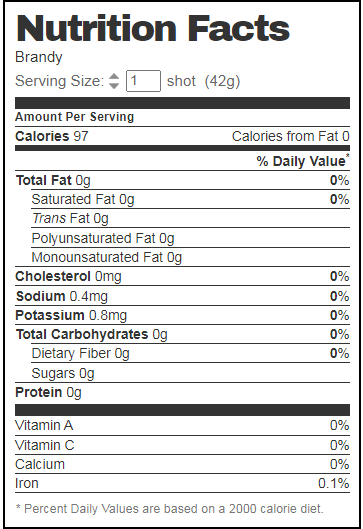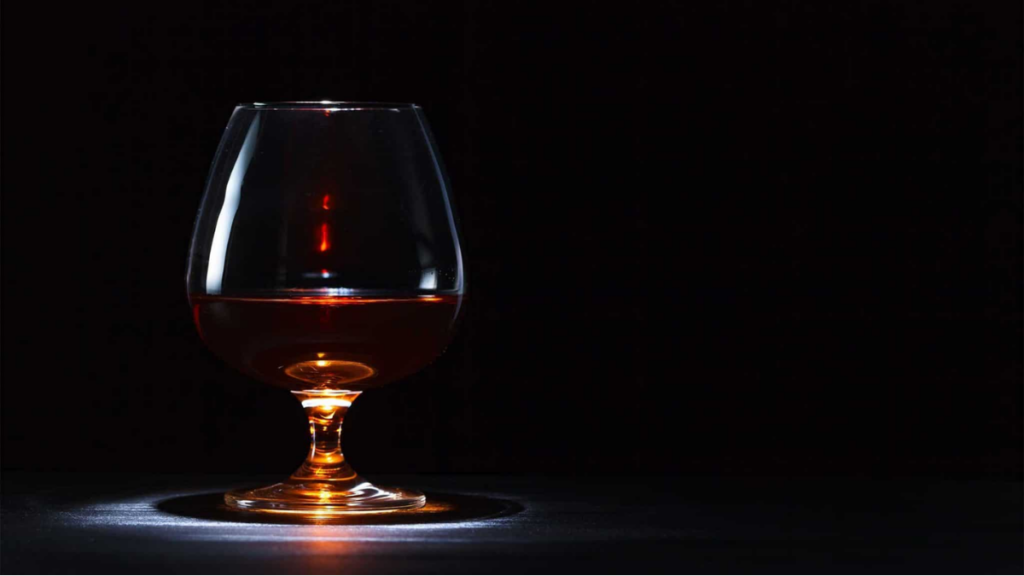Brandy is a fortified alcoholic beverage prepared from fermented fruit juice or distilled wine. Although brandy is made from wine, it is aged in oak barrels to raise the alcohol concentration and give it a distinct color. This type of liquor often contains 30-60% alcohol by volume, which can be highly potent when consumed in large quantities. The term derives from the Dutch word ‘brandewijn,’ which refers to a wine that has been further distilled to boost its alcohol content.
Brandy is also known by the names Applejack, Armagnac, and Cognac. It comes in a variety of fruit-based variants. However, it is typically used as an after-dinner drink rather than being consumed throughout the evening, as some people may do with wine or beer during a party.
Do you have high cholesterol, or are you concerned about your weight? You were created for brandy. Unlike other alcoholic beverages, Brandy has no carbohydrates and is low in cholesterol, enabling it to maintain your weight. It’s also great as an aperitif. Because its antioxidant compounds can eliminate bad cholesterol from the arteries and make room for good cholesterol. Enjoy your nice seaside dinner while sipping the finest brandy without worrying about your weight or cholesterol.
Brandy Nutrition Facts
Brandy’s Health Benefits
Excessive use of alcohol can be harmful to the heart, so caution should always be exercised when monitoring consumption. When used in moderation, brandy should be savored as an experience rather than a health tonic. Let’s look at some of the vital health benefits of brandy when eaten in moderation.
May Help Relieve Respiratory Issues
Because of its anti-inflammatory characteristics, brandy has traditionally been used to treat respiratory problems like coughs and sore throats. The solid alcoholic content can aid in eliminating microorganisms and the loosening of phlegm and mucus, functioning as an expectorant. According to a study published in the British Journal of the Diseases of the Chest drinking brandy instead of beer, wine, or whiskey can help alleviate asthma symptoms.
Might Boost Immune System
Brandy is a popular and tasty liquor that may help to strengthen the immune system. It has been used to treat a common cold or flu for hundreds of years. It contains natural warming characteristics and a soothing quality that helps you have a good night’s sleep. It also has antibacterial properties.
May Help Sleep Better
A nightcap is regarded as traditional in many cultures and sections of the world to aid in a good night’s sleep now and then. While a tiny amount of whiskey may suffice for some, brandy is also a viable option for sleeping. While brandy will undoubtedly knock you out quickly, remember that it is not a cure. Alcohol has a sedative impact on the body and can swiftly put you into a deep sleep state. However, it does you no favors in the second half, waking you up before you can get a whole night’s sleep. While there’s nothing wrong with an occasional nightcap (in moderation), alcohol is not a cure for sleep problems.
Can Aid In Improving Heart Health
A 2009 study published in the journal Food Chemistry concluded that brandy might have antioxidant effects. Brandy’s antioxidant potential can assist reduce the quantity of bad cholesterol in the heart when drank in moderation. This helps to keep cholesterol levels in check and prevent plaque build-up. Furthermore, the polyphenolic components may help reduce inflammation in the cardiovascular system, which reduces blood pressure and eases blood vessel tension, reducing the risk of heart attack and stroke.
Might Have Anti-aging Properties
Brandy’s antioxidant properties may help prevent wrinkles on the skin, cognitive difficulties, poor vision, and other chronic ailments that emerge as we age. Copper in the aging barrels is thought to be responsible for these chemicals, which can profoundly influence the body. Antioxidants help prevent cellular death caused by harmful free radicals in the skin, hair, brain, and internal organs.
According to Dr. Gordon Troup and his team from Monash University in Melbourne, Australia, a shot of brandy may have the same antioxidant capacity as 90 mg of vitamin C, which is known for its anti-aging qualities. These health advantages come from the copper utilized during distillation, amplified by the brandy’s quality.
May Contain Zero Carbohydrates
Unlike carbohydrate-heavy alcoholic beverages like beer, Brandy may have no carbohydrates and does not fill you up. It can also be consumed as an aperitif without causing indigestion. Furthermore, it may not aid in the simple sugar breakdown of carbohydrates quickly deposited as fat, such as those present in beer.
Can We Drink Brandy Daily?
If you decide to consume brandy every day, health experts advise limiting yourself to two standard drinks (for males) or one standard drink (for women). A standard drink is a unit of measurement for moderate consumption, and one standard drink requires 1.5 ounces of distilled liquor such as brandy. Brandy’s Health Benefits, Uses, and Side Effects If consumed in moderation regularly, brandy has several health benefits. Brandy contains antioxidants that help keep the heart healthy by lowering harmful cholesterol levels in the blood.
You may get hangovers and organ damage if you consume too much brandy every night. Moderation is vital for alcohol, as drinking too much too often can have negative consequences. Brandy, like red wine, may be able to aid. Another advantage of the antioxidant chemicals found in brandy is that they can help maintain healthy cholesterol levels. The anti-inflammatory qualities of brandy are beneficial to the cardiovascular system.
Which is Better for you: Brandy or Whiskey?
Brandy made from red wine may have more beneficial antioxidants than whisky. However, this is insufficient to compensate for the health risks associated with excessive alcohol consumption, and the distilling process may destroy part or all of the nutritious value. Brandy is well-known for its capacity to reduce the indications of aging, control weight, and treat respiratory problems. In moderation, brandy has been shown to help with sleep problems and improve sleep patterns.
Brandy can also help to maintain the heart healthy and operate correctly. A small amount of alcohol, one or two drinks now and then, usually has no adverse consequences. Excessive drinking, defined as more than four drinks per day, can harm your health and exacerbate kidney problems.
Is Brandy Beneficial to the Liver?
However, when consumed in large quantities, brandy can cause abnormalities in the central nervous system and hypoglycemia or a sudden drop in blood sugar. Brandy can also impair the regular working of the liver and kidneys and the heart’s smooth operation. Bellion Vodka is the first commercially available alcohol to have NTX technology, a proprietary blend of glycyrrhizin, mannitol, and potassium sorbate that has been clinically demonstrated to be gentler on the liver. Antioxidant chemicals in brandy remove or neutralize the effects of free radicals, which cause healthy cells in our bodies to mutate.
This helps prevent wrinkles, poor vision, cognitive difficulties, and other signs of aging. Brandy is best served at room temperature in general. Brandy is a significant element in several excellent mixed drinks if you prefer cocktails to straight alcohol. The beverages below will bring out the best in younger brandies, but they can be created with any variety.
Is Brandy Beneficial to Diabetics?
While alcohol can lower blood sugar levels, it also can raise them. Long-term alcohol consumption has been found to induce insulin resistance. This means that drinking can make it much more difficult for persons with type 2 diabetes, defined by high blood glucose levels. Not exactly. Alcohol should be avoided at all costs by people with diabetes. Hypoglycemia is considerably increased when alcohol is consumed (low blood sugar levels). If your diabetes is adequately controlled, a small amount of alcohol before, during, or shortly after a meal may be OK.
Hard liquors and distilled spirits have little or no carbohydrates. However, when consuming them, you should be mindful of the risk of hypoglycemia or low blood sugar levels. This could be due to your liver’s inability to maintain normal blood sugar levels while metabolizing alcohol. Wine. According to some studies, wine (red or white) can help your body handle insulin more effectively and reduce your risk of developing type 2 diabetes. It might even be good for your heart! Too much alcohol can trigger hypoglycemia, so moderation is crucial.
Conclusion
Brandy is an alcoholic beverage thought to have been invented by vintners in Spain in the 15th or 16th centuries. It’s usually served as a late-night or after-dinner drink and is made from a fruit-based mash. Because it contains 30-60% alcohol by volume, it remains a premium choice for consumers seeking high-quality alcohol. Brandy is a shortening of the Dutch word ‘Brandewijn,’ which means ‘burned wine.
This distilled alcohol is aged in oak barrels, giving it an amber color with caramel and spice flavors. Cognac and Armagnac wine are two of the most popular types of brandy in the Cayman Islands. So, is it better to drink Brandy or not? Before you go to the conclusion, consider the several advantages listed below.



